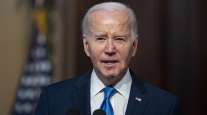Navistar to Pay Penalty on 13-Liter Engines That Were Sold But Didn’t Meet 2010 Rules
This story appears in the Feb. 27 print edition of Transport Topics. Click here to subscribe today.
The Environmental Protection Agency has formally granted Navistar Inc. approval to pay up to a $1,900 penalty for each new heavy-duty engine it produces that is not compliant with 2010 federal emissions standards, the agency confirmed last week.
Although details were not available at press time, EPA said it certified Navistar’s 13-liter engine for production effective Feb. 14, a necessary step for the truck maker to continue to sell the engine after its emissions credits run out.
The engines’ emissions of nitrogen oxides exceed EPA’s 2010 limit, but Navistar has been allowed to sell the engines because the company accumulated emissions credits for selling other engines with emissions below EPA limits.
Neither EPA nor Navistar would confirm whether the certification meant that the emissions credits, expected to run out at the end of February, had actually run out effective the date of the EPA Feb. 14 certification.
“We can’t confirm or deny that,” said an EPA spokeswoman. “But in general, you should not automatically assume that because they used the non-conformance penalties that they are out of credits.”
Meanwhile, Navistar officials were in closed-door negotiations with California environmental regulators last week to avert a possible ban on the truck maker’s new engines being sold in the state as soon as next month, according to a spokeswoman for the California Air Resources Board.
The talks have centered on a Jan. 13 CARB executive order declaring that Navistar’s heavy-duty engine emissions credits were due to run out on Feb. 29 and as a result Navistar could not longer produce engines in the state.
“Navistar is in discussions with ARB on its executive order set to expire and what the next steps will be,” said the spokeswoman, Karen Caesar.
Neither Caesar nor Navistar spokeswoman Karen Denning would comment on the specifics of the negotiations.
Although Navistar has declined to comment on when its emissions credits will expire, CARB officials said the executive order was “based on the manufacturer’s statement of credit balance and projected production.”
Navistar has been applying credits it earned in past years when some of its engines burned more cleanly than federal standards required.
CARB officials, however, believe those credits will run out by the end of February.
While EPA officials plan to assess financial penalties against Navistar if it manufactures emissions non-compliant engines, CARB officials said they have no statutory authority to impose financial penalties.
CARB’s only option, therefore, is to not allow the engines to be sold in California.
Navistar has used the emissions credits, built up from its 2007 through 2009 heavy duty truck engine models, to comply with the 2010 federal emissions standard of 0.2 gram per brake horsepower hour.
Navistar is the only heavy-duty truck manufacturer to use exhaust gas recirculation technologies to reduce nitrogen oxide emissions. All other heavy-duty engine manufacturers use selective catalytic reduction technologies to reduce NOx emissions.
Late last month, the truck maker formally submitted to the EPA a 13-liter heavy-duty engine that it said meets the current EPA standard.
Navistar delivered its engine model just days after EPA revealed that it would assess the company up to $1,900 for every heavy-duty engine it sells that doesn’t meet the 0.2-gram standard after the credits run out (1-30, p. 1).
EPA officials have said they also expect the company’s credits to run out at the end of February.
Jack Allen, president of Navistar’s North America Truck Group, said at a Feb. 1 analyst conference that the company is hoping to get its 13-liter engine certified as 2010 emissions-compliant before the credits run out.
If it doesn’t, Allen said that the company will pay the EPA non-conformance penalties. “We think that if we do go down that path, the impact to us financially this year will be minimal,” Allen said.




